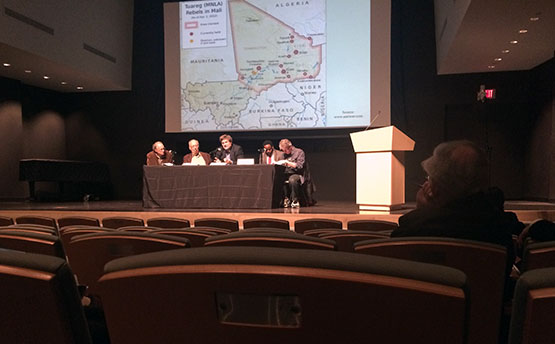Islam in Africa discussion sheds light on issues of terror
April 28, 2015
SUNY Buffalo State held a panel discussion to talk about the history of Islam and Islamism, and shine light on the crisis in West Africa and what the subregion’s human rights are.
The international symposium was held from 12 p.m. to 2 p.m. on April 24 at the Burchfield Penny Art Center. The panel included four experts on Islam, Islamism, and human rights in Africa.
Martin Klein, a professor at the University of Toronto, was one of the panel experts and focused his presentation on the history of Islam’s culture and the history of terror in West Africa.
“Terror has been used by a wide range of different social and religious movements, and that it is not an ‘ism’ in that there is no single terrorist ideology,” Klein said in his abstract for the presentation. “Terror is a tactic generally used by movements that are weak and usually unsuccessful.”
His research focused on two locations in West Africa. The first one being Senegal, where he said in his abstract has been a pillar of democracy and tolerance, and where not only terror but also fundamentalism has had little affect. The second place is Northeast Nigeria, where Boko Haram has been one of the “Islamist” movements.
When it comes to the extremist groups in West Africa, Klein said they try and justify their extreme actions within the religion and culture.
“Terrorists do evil, they are not necessarily evil,” Klein said. “They dilute themselves into thinking they have some moral purpose and that’s why some people commit horrible acts.”
Bruce Hall, an associate professor in the history department at Duke University, was another panelist at the discussion who talked about the Islamist solutions to post-colonial crises in West Africa.
“Terrorism is very real in West Africa,” Hall said during his presentation.
His research looked into the mix of ethnic nationalism and global jihadism, rebels who were once living in Libya and were able to acquire military equipment from the collapsing regime of Mu’amar Gadhafi. He added that the jihadist movements is something that started in West Africa over the last decade and it’s an issue that needs to be acknowledged in order to make some changes.
“It’s not simply about ideas or that they’re people who share these ideas of Al-Qaedaism on the continent and who are already in West Africa,” Hall said. “My idea is to think about the rule of groups like al-qaedaism in terms of the solutions that they pose for existing political issues and problems that they find.”
Ndubueze Mbah, an assistant professor at the University at Buffalo teaching African History, gave the last presentation. His presentation focused on the historical perspectives on jihadism in Africa and the religious logic of Boko Haram.
“These processes have always entailed a revolutionary attempt to realize Islam as a total system, not just a religion, but rather a way of life that determines the social, economic, political, moral and legal norms of society,” Mbah said in his written abstract.
During his presentation, he addressed the problem that by creating a stigma towards the culture in West Africa and “dismissing Boko Haram as mindless terrorists and uneducated extremists, the media scholars and Nigerian government oversimplified the movement’s complex religious and historical ideological base.”




